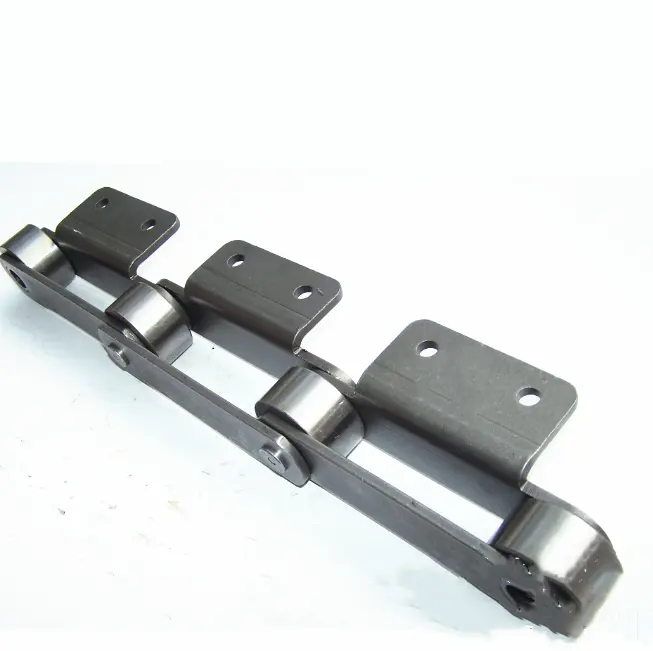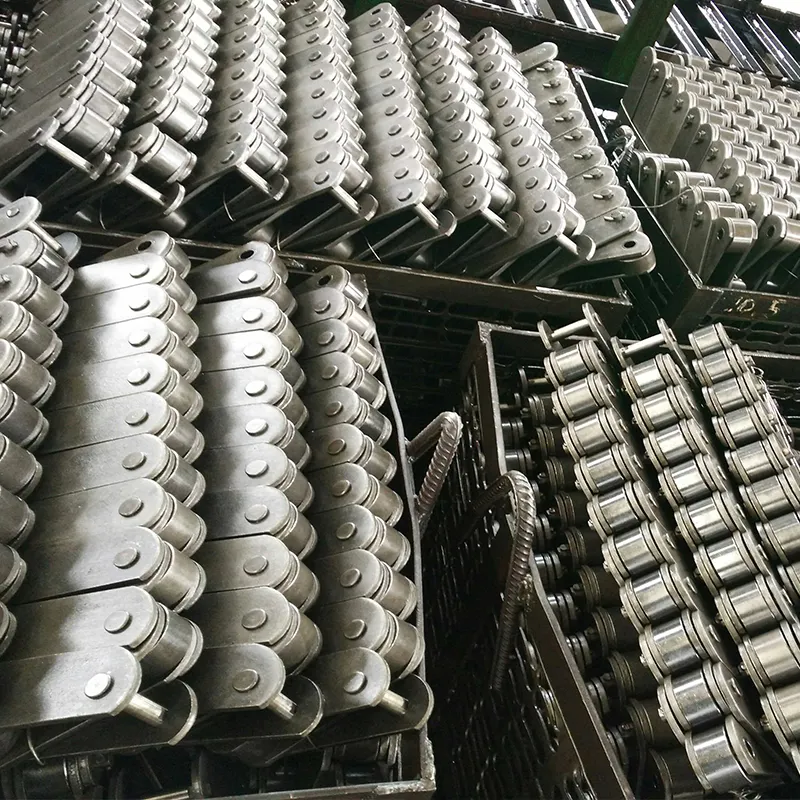Product Description
Product Description
1, Our Chain types: Agricultural roller chain, mining processing chain, motorcycle roller chain, sugar industry chain, cement industry chain, weld steel drag chains etc;
2, Main materials: It is 40Mn. 40Cr, 45Mn alloy steel, SUS304, and POM Plastic for plates, 10#, 20#, 20CrMnMo, 30CrMnTi for pins and rollers;
3, Heat treatment: Carburizing, Austemper Stressing, nitro-caburizing harden etc;
4, Surface: Shot peening, black, blue or original;
Detailed Photos
For example of heavy duty offset sidebar roller chain 1245 (3315), 4571 (5031), 4824 (6035), 3075 (13P)
Product Parameters
Packaging & Shipping
plastic bag+carton+ OSB Case
Shipping way: these products will be shipped to your local port by sea, these also could be sent to your specific address by air.
Our Advantages
Our chains could be customized according to your actual order quantity, actual drawing and actual requirement. We have own chain process workshop, heat treatment workshop, process equipments and experienced designers.
(01)Assembled workshop
(02)Punching plate workshop
(03)Plate fabrication workshop
(04)Heat treatment workshop
(05)Shot peening workshop
(06) our warehouse
After Sales Service
Our products can be repaired or replaced the new parts with free cost in six months.
| Material: | Alloy |
|---|---|
| Structure: | Roller Chain |
| Surface Treatment: | Carburizing and Quenching |
| Chain Size: | 78.11mm |
| Feature: | Heat Resistant |
| Plate Height: | 40mm |
| Customization: |
Available
| Customized Request |
|---|

How do mill chains handle material flow and transfer in bulk handling applications?
Mill chains are specifically designed to handle material flow and transfer in bulk handling applications with efficiency and reliability. These chains are widely used in various industries, such as agriculture, mining, construction, and more, where bulk materials need to be transported in large quantities. Here’s how mill chains achieve material flow and transfer:
1. Robust Construction: Mill chains are constructed using high-quality materials, such as alloy steel, which provides excellent strength and durability. Their robust design allows them to handle heavy loads and withstand the stresses of continuous material transfer.
2. Precise Alignment: The design of mill chains ensures precise alignment between the chain and sprockets. This alignment helps to maintain a smooth and consistent material flow, reducing the risk of jams or blockages in the system.
3. Flexibility: Mill chains are flexible enough to adapt to various conveyor configurations, including inclined or declined conveyors. This flexibility enables them to efficiently transport materials across different terrains and elevations.
4. Low Friction: Mill chains are designed to minimize friction during operation. This low friction characteristic reduces the energy consumption and wear on the chain, resulting in a longer service life and improved material transfer efficiency.
5. Adaptability: Mill chains are suitable for handling a wide range of bulk materials, including grains, aggregates, ores, coal, wood chips, and more. Their adaptability makes them a versatile choice for different industries.
6. Conveyor Systems: In bulk handling applications, mill chains are commonly used in conveyor systems. These systems utilize rotating sprockets to move the chain, and the material is carried along the conveyor’s path, ensuring a continuous flow of materials from one point to another.
7. Bucket Elevators: Mill chains are often employed in bucket elevators, which lift and transfer bulk materials vertically. The buckets attached to the chain scoop up the material and discharge it at the desired location, providing an efficient material handling solution.
Overall, mill chains are essential components in bulk handling applications, ensuring the smooth and consistent flow of materials in various industrial processes. Their reliable performance, strength, and adaptability make them a preferred choice for material transfer in many industries.

Can mill chains be used in pharmaceutical manufacturing and processing equipment?
Yes, mill chains can be used in pharmaceutical manufacturing and processing equipment for specific applications. However, it is essential to consider several factors and choose the appropriate type of mill chain to meet the unique requirements of the pharmaceutical industry.
Here are some points to consider:
1. Material Compatibility: The materials used in the construction of the mill chain must be compatible with pharmaceutical products and meet industry regulations. Stainless steel or food-grade materials are often preferred to ensure product safety and hygiene.
2. Cleanability: Mill chains used in pharmaceutical applications should be designed for easy cleaning and sanitization. Smooth surfaces and fewer crevices can minimize the risk of product contamination.
3. FDA Compliance: In pharmaceutical manufacturing, adherence to regulations set by the U.S. Food and Drug Administration (FDA) or other relevant regulatory bodies is critical. The chosen mill chain should comply with these standards.
4. Product Handling: Consider the specific requirements of the pharmaceutical products being handled. The mill chain should be capable of transporting, elevating, or conveying the products efficiently and without risk of contamination.
5. Corrosion Resistance: Depending on the pharmaceutical processes involved, the equipment may be exposed to chemicals or cleaning agents. A corrosion-resistant mill chain can withstand these harsh conditions and extend its service life.
6. Surface Finish: A smooth surface finish on the mill chain can prevent the accumulation of debris and contaminants, making cleaning more effective.
7. Lubrication: Some pharmaceutical processes require special lubrication considerations to avoid any potential product contamination. Food-grade or pharmaceutical-grade lubricants may be necessary.
8. Sanitary Design: Choosing a mill chain with a sanitary design, including self-draining features and easy disassembly, can facilitate thorough cleaning and minimize the risk of bacterial growth.
9. Validation and Documentation: The mill chain supplier should be able to provide validation documents and certification to demonstrate compliance with industry standards and regulations.
By carefully considering these factors and working with reputable suppliers, pharmaceutical manufacturers can use mill chains safely and effectively in their processing equipment while maintaining the required quality and hygiene standards.

Can mill chains be used in the mining and mineral processing industries?
Yes, mill chains are commonly used in the mining and mineral processing industries. These chains are designed to handle heavy loads and harsh operating conditions, making them well-suited for various applications in this sector. Here’s how mill chains are utilized in mining and mineral processing:
1. Material Handling: In mining operations, mill chains are used for material handling tasks such as transporting ores, rocks, and other raw materials. They are often employed in conveyor systems to move bulk materials from one location to another efficiently and reliably.
2. Crushing and Grinding: Mill chains play a crucial role in the crushing and grinding processes, where large chunks of minerals or ores are broken down into smaller particles for further processing. These chains are used in crushing machines and ball mills to ensure the smooth movement of materials throughout the equipment.
3. Agglomeration: Mill chains are used in agglomeration processes, where fine particles are combined to form larger particles or pellets. These chains are vital for maintaining the integrity of the agglomerates and ensuring proper handling during the agglomeration process.
4. Heap Leaching: In heap leaching operations, mill chains are used to stack and reclaim heaps of crushed ore, allowing for efficient leaching of valuable minerals from the ore.
5. Tailings Management: Mill chains are also used in tailings management systems, where they assist in the transportation and disposal of tailings, which are the waste materials produced during mineral processing.
6. Robust and Durable: Mining and mineral processing operations demand equipment that can withstand heavy loads, abrasion, and harsh environments. Mill chains are designed with these factors in mind, ensuring their durability and reliability even in challenging conditions.
Overall, mill chains are a critical component in the mining and mineral processing industries, contributing to the efficiency and productivity of various processes involved in extracting and processing valuable minerals.


editor by CX 2023-09-23